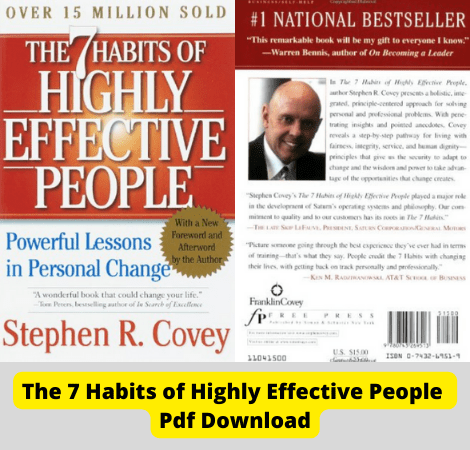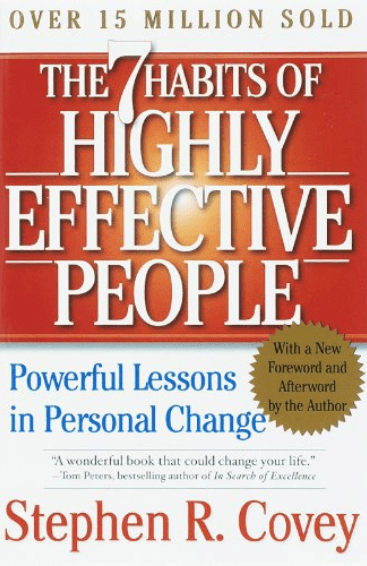There is always an area for improvement and improvement starts with “I”.Stephen R. Covey’s self-improvement book, “The 7 Habits of Highly Effective People” is a self-help book. It is based on Covey’s notion that our perceptions of the world are solely our own. We must change ourselves to alter a circumstance, and we must be able to modify our views to change ourselves.
Take charge. Many individuals, according to Covey in this chapter, are reactive (allowing external events to define their behavior) rather than proactive (taking control for their behavior and decisions). Rather than blaming the world for your troubles or allowing others’ actions, or even terrible weather, to determine your attitude, you may be a more productive person by concentrating on the things you can control (your Circle of Influence) and ignoring the ones you can’t.
Make a start with the finish in mind. When you do an action, according to Covey, you do it twofold. The initial time, you see yourself doing it, and the second time is when you do it. He gives the example of constructing a home. After visualizing the house and creating precise blueprints for the layout and materials required, you can begin construction. If you didn’t plan ahead of time, you’re sure to make a lot of costly blunders.
| Name | The 7 Habits of Highly Effective People |
| Author | Stephen R. Covey |
| Publisher | Free Press |
| Pages | 384 |
| Language | English |
Also Download: Can’t Hurt Me by David Goggins | A Court of Mist and Fury by Sarah J Mass
The 7 Habits of Highly Effective People By Stephen R. Covey Pdf Download.
The takeaway here is that visualizing an activity and its desired outcomes beforehand, rather than ploughing ahead, maybe in the incorrect direction, increases your chances of success. The distinction between efficiency and effectiveness may be seen here. It’s pointless to do a large number of things in a short time if the result isn’t exactly what you desire.
Prioritize your goals.Prioritization is important to this behavior. You must choose what matters most and prioritize them.
Covey divides work into four quadrants, which he depicts on a table. Concentrate on Quadrant Two first, he advises, since these are the items that will possess long-term benefits and will help you achieve your greater objectives. . The more you focus on these, the lesser activities will appear in Quadrant One, which most people consider the most important.

Account for the phrase “win-win”. Life is a never-ending cycle. Many people desire a “win-lose” outcome when they enter a scenario with others; every encounter they have, whether in personal life or at work, is viewed as a competition. Effective individuals, on the other hand, see the value of distributing a fair portion of the pie and cultivating strong long-term connections. Approach every scenario to negotiate until all sides are happy; you’ll reap the benefits in the end.
Relationships, according to Covey, are like “emotional bank accounts.” This implies that every time you connect with anyone, you are either putting money into or taking money out of their account. Finding a win solution or carefully listening to someone might be considered a payment. A withdrawal might mean pursuing a win-lose situation, betraying a commitment, or only seeming to listen. The most significant deposit you can make into someone’s emotional bank account is to strive to fully understand them and learn what matters to them. Attempt to comprehend before attempting to comprehend. “Most people don’t listen to comprehend; they listen to respond,” Covey explains. He explains that we don’t always listen to people, instead endeavor our scenario onto them and presume that their thoughts and feelings are the same as ours. Then we provide them with non-working solutions. People are hesitant to take advice from someone they don’t believe truly knows them or their position.
The 7 Habits of Highly Effective People Full Book Pdf Download.
To comprehend someone academically and emotionally, you must forcefully listen to them and enter inside their reference frame. To receive the complete picture, pay attention not only to what they’re saying but also to their body language. Create a symbiotic relationship.Synergy simply implies that when two items are joined, the result is larger than the sum of the two individual components. If you work together, 1+1 can equal 3 or more. It’s always preferable to work together to overcome a task, utilizing everyone’s skills, than to battle each other and try to go it alone. To do this, you must first comprehend, trust, and respect one another.
If you wish to keep cutting, sharpen the saw.The seventh habit focuses on personal development. Your equipment may be appropriate for the work, but if you don’t sharpen them, it’ll lose its effectiveness. Covey compares it to a lumberjack chopping down trees: if he continues sawing without halting for sharpening his saw, it would ultimately grow dull, and he will be unable to cut down trees. The book follows a logical progression that sets out the steps to become a successful and competent person. The text is supplemented with several graphics, charts, and tables, including representations of the Circles of Concern and Influence. With overlapping circles of knowledge, abilities, and desire, a Venn diagram depicts what are productive habits. A picture depicting how the seven habits are dependent on one another is presented multiple times throughout the book. A weekly planner is also included. The book will show its real power only after we start applying its lessons in real life.

